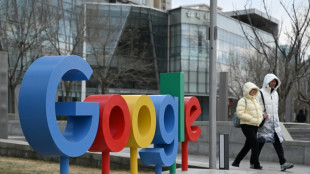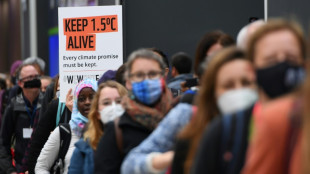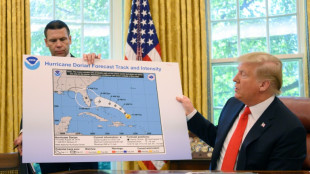
-
 Nissan shares plunge as report says Honda merger talks off
Nissan shares plunge as report says Honda merger talks off
-
China holds out hope last-minute deal can avert US trade war

-
 LeBron relishing 'special' Doncic double act
LeBron relishing 'special' Doncic double act
-
Tatum shines as Celtics down Cavs, Lakers thrash Clippers

-
 Myanmar junta bid to sell Suu Kyi mansion flops for third time
Myanmar junta bid to sell Suu Kyi mansion flops for third time
-
Australia bans DeepSeek AI program on government devices

-
 Olympics on horizon as China hosts Asian Winter Games
Olympics on horizon as China hosts Asian Winter Games
-
Tatum, White shine as Celtics down Cavs

-
 Google pledge against using AI for weapons vanishes
Google pledge against using AI for weapons vanishes
-
African football has the platform for historic World Cup success

-
 France prop Gros happy to go 'under radar' for Dupont's benefit
France prop Gros happy to go 'under radar' for Dupont's benefit
-
Bove's future uncertain after heart attack horror as Fiorentina finish Inter clash

-
 Race against time to complete contested Milan-Cortina bobsleigh track
Race against time to complete contested Milan-Cortina bobsleigh track
-
Speed queen Goggia pursuing Olympic dreams with 2026 Winter Games on horizon

-
 Asian markets stutter as traders weigh China-US trade flare-up
Asian markets stutter as traders weigh China-US trade flare-up
-
French PM set to survive no confidence vote

-
 Trump says US will take over Gaza, create 'Riviera of the Middle East'
Trump says US will take over Gaza, create 'Riviera of the Middle East'
-
Google shares slide on spending plans despite sales jump

-
 Honda shares jump on reports it wants Nissan as subsidiary
Honda shares jump on reports it wants Nissan as subsidiary
-
Trump says US will 'take over' Gaza as he welcomes Netanyahu

-
 Netflix drops 'Emilia Perez' star Oscar bid over offensive posts: reports
Netflix drops 'Emilia Perez' star Oscar bid over offensive posts: reports
-
Sirianni embraces emotions ahead of Chiefs rematch

-
 Top climate scientist declares 2C climate goal 'dead'
Top climate scientist declares 2C climate goal 'dead'
-
US Treasury says Musk team has 'read-only' access to payments data

-
 Leaders 'should respect' wishes of Palestinians to stay in Gaza: Palestinian UN envoy
Leaders 'should respect' wishes of Palestinians to stay in Gaza: Palestinian UN envoy
-
Paris Saint-Germain, Brest, Dunkerque advance to French Cup last eight

-
 Simeone brace helps Atletico thrash Getafe, reach Copa del Rey semis
Simeone brace helps Atletico thrash Getafe, reach Copa del Rey semis
-
Trump hosts Netanyahu for pivotal Gaza ceasefire talks

-
 Atletico thrash Getafe to reach Copa del Rey semis
Atletico thrash Getafe to reach Copa del Rey semis
-
Stocks recover but tariff uncertainty lingers over market

-
 Shiffrin to sit out world team combined, dashing Vonn hopes
Shiffrin to sit out world team combined, dashing Vonn hopes
-
Mahomes avoids 'G.O.A.T' talk as history beckons

-
 Undav sends Stuttgart into German Cup final four
Undav sends Stuttgart into German Cup final four
-
Alcaraz battles through in first match since Australian Open

-
 Trump backs jailing Americans in El Salvador if has 'legal right'
Trump backs jailing Americans in El Salvador if has 'legal right'
-
What Elon Musk's Twitter tactics may bode for US government

-
 Trump signs order withdrawing US from UN bodies
Trump signs order withdrawing US from UN bodies
-
'Bodies on the ground': mass shooting shocks Sweden's Orebro

-
 Rubio brushes aside aid uproar
Rubio brushes aside aid uproar
-
Rubio accuses Cuba, Nicaragua, Venezuela over migration crisis

-
 Ex-world number one Halep announces retirement after home defeat
Ex-world number one Halep announces retirement after home defeat
-
Trump taps 'Sharpiegate' meteorologist to lead top science agency

-
 US flying detained migrants to Guantanamo
US flying detained migrants to Guantanamo
-
Netanyahu to meet Trump on Israel-Hamas truce

-
 Trump says Palestinians would 'love' to leave Gaza
Trump says Palestinians would 'love' to leave Gaza
-
Trump in 'no rush' to speak with China's Xi despite tariff battle

-
 'Rare earths' for aid: Ukraine's minerals threatened by war
'Rare earths' for aid: Ukraine's minerals threatened by war
-
Taliban suspend women's radio station in Afghanistan

-
 Trump ally known for racist comments gets top State Dept job
Trump ally known for racist comments gets top State Dept job
-
Trump seeks species protection rollbacks to promote US drilling


US recession fears grow as Fed plots aggressive course
The Federal Reserve has made clear it will come out guns blazing to battle the highest inflation rate in four decades, but that has sparked increasing fears their campaign will plunge the world's largest economy into recession.
The US central bank is facing a daunting task as it tries to engineer a "soft landing" that preserves growth while tamping down worrying price pressures against an uncertain global backdrop.
It will require "exquisite calibration," longtime Fed watcher David Wessel told AFP.
The United States has roared back from the Covid-19 pandemic, posting solid growth and record job gains thanks to massive government aid and aggressive stimulus from the Fed, which cut the benchmark lending rate to zero in March 2020.
But the rebound has hit multiple stumbling blocks, including renewed waves of the virus and shortages of key supplies and workers that sent prices surging. It must also now navigate the fallout from the war in Ukraine, which has caused a jump in oil prices.
The Fed last month raised interest rates by a quarter point in the first of a series of increases, and since then a chorus of officials -- including Fed Chair Jerome Powell and Governor Lael Brainard -- have signaled their openness to half-point rate increases, a more aggressive measure.
Wessel, director of the Hutchins Center on Fiscal and Monetary Policy at the Brookings Institution, cautioned that the Fed's tough stance means policymakers are "more likely to overdo it than under do it."
The Fed was caught by surprise at the speed with which inflation spiked late last year, initially driven by prices for cars and housing before spreading into other categories.
Consumer prices jumped 7.9 percent in February, the highest annual increase since 1982, but spending has nonetheless remained robust even amid new coronavirus variants.
Higher borrowing costs work by dampening consumer and business spending, bringing demand more in line with supply to lower prices.
Red-hot housing demand has already cooled as mortgage rates rose in anticipation of the Fed hikes, and data this week from the Mortgage Bankers Association indicate lenders are tightening credit availability.
- 'Very careful' -
Global stock markets have sagged in recent days amid the tough talk from Fed officials -- including from Brainard, who this week called fighting inflation "paramount."
Economists agree the Fed's stance is appropriate to prevent high inflation from becoming embedded, eroding purchasing power and eating into recent wage gains.
The situation raises the specter of the 1980s, when a wage and price spiral and oil embargo from OPEC member states prompted then-Fed chief Paul Volcker to crank up interest rates, which ground down inflation but caused a recession.
But Dana Peterson, chief economist at The Conference Board, said the current situation is "very different," notably because the economy and labor market are strong, and the Fed has built up its inflation-fighting credibility.
While the recession angst is understandable, "We need to give the Fed some credit," Peterson told AFP.
Policymakers are looking at all the factors "and really want to calibrate this" to achieve a soft landing, and she predicted the Fed "will do everything in its power, not to 'go too far.'"
But she cautioned that the central bank cannot control the supply shocks that have hit the economy, including the ongoing pandemic.
- Offloading bond holdings -
Economists are expecting several rate hikes this year and next, including multiple half-point increases, with the first of those likely coming in early May when the policy-setting Federal Open Market Committee (FOMC) next meets.
The Fed also has another tool to deploy this time, which is to reduce their massive bond holdings built up during the pandemic that were meant to ensure financial markets had ample cash to support the economy.
The minutes of last month's FOMC meeting released Wednesday indicated the $9 trillion balance sheet could be reduced by $95 billion a month, a much faster pace than in the wake of the 2008 global financial crisis.
But as an untested policy tool, it is unclear how that will interact with rate hikes.
"It's tricky," Wessel said, but given the strength of the economy "a mild and short recession... might be a tradeoff that policymakers are willing to make" to vanquish inflation.
N.Fournier--BTB
